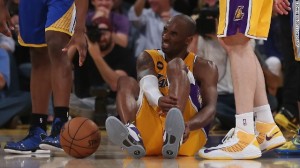

|
Back to Archive Index |
APRIL 30,2013 Weekend Warriors Most Likely to Tear an Achilles Tendon If you're a man who exercises mostly on the weekend, a so-called "Weekend Warrior," you have a higher risk of rupturing your Achilles tendon while playing sports than other Americans. Kobe Bryant, the Los Angeles Lakers star basketball player who ruptured his Achilles tendon earlier this month, is in good company, according to a new study of Achilles tendon injuries in the US.  Basketball leads to about 1/3 of all Achilles ruptures in the US, followed by tennis (9%) and football (8%), report researchers in the April issue of Foot & Ankle International. They reviewed 406 records from patients diagnosed with Achilles tendon injuries from August 2000 to December 2010. On average, the patients who ruptured their Achilles tendon were 46 years old, mostly men (83%), and were injured playing sports (more than 2/3rds). Older patients (over age 55) and those whose body mass index (BMI) was greater than 30 (considered obese) were more likely to have non-sports related causes and were more likely to not have been diagnosed correctly until more than one month after the injury. More than 1/3 of the tendon ruptures not caused by sports occurred at work. When the diagnosis was missed, it was usually because the initial diagnosis was an ankle sprain. "Delayed diagnosis and treatment have been shown to result in poorer outcomes," says lead author Steven Raikin, MD, of the Rothman Institute in Philadelphia, PA. "Older individuals, and those with a higher BMI, should be evaluated carefully if they have lower leg pain or swelling in the Achilles tendon region." Re-rupture of the same tendon occurred in 5% of the group, and 6% of the study's population had previously ruptured the other leg's tendon. The study supports previous findings that an Achilles tendon rupture on one leg increases the likelihood of a rupture on the other leg. When the same tendon was re-ruptured, 85% of those injuries had not been treated surgically earlier. Signs of an Achilles Rupture One sign of an Achilles rupture is the inability to stand on your toes. However, this test is not completely reliable. Also, when you walk, your foot may turn out to the side. A ruptured Achilles tendon can be confused with a partial rupture because it may cause little pain at first. In fact, an Achilles rupture is quite often misdiagnosed. The only foolproof way to know if you have ruptured this tendon is to lie on your stomach with your foot off the end of a bed, toes pointing down, and have someone squeeze your calf. The front of the foot normally will move down. If there is no flex in the foot, then the tendon is torn. You can also compare the two legs. Squeeze the uninjured leg first to observe the flexing movement, and then squeeze the injured leg to see whether it moves. As this new study shows, if you injure your Achilles tendon, getting to a doctor sooner than later will speed your recovery. |
|
|
|
Disclaimer and Copyright · Site design by Marketorial.com
|